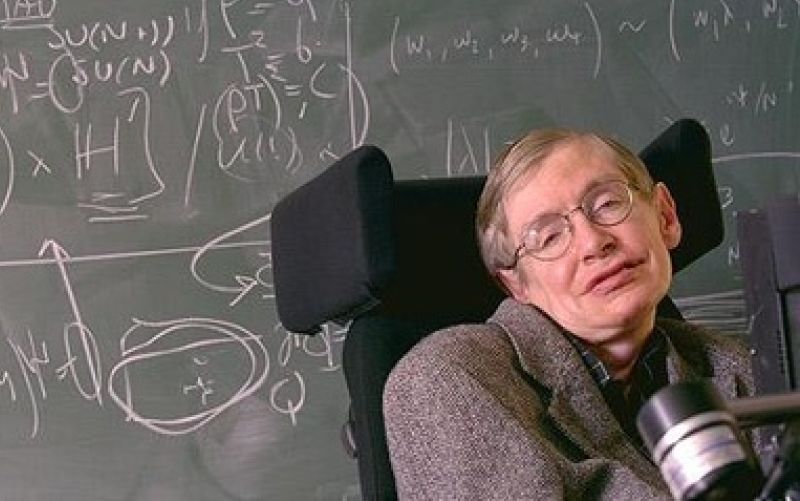Tributes have been paid to Stephen Hawking, the world-renowned physicist and “disability icon” who was seen by many disabled people as a hugely-important role model, who died this week.
Among the disabled people who highlighted the importance of his achievements was the political journalist Dr Frances Ryan, who said on Twitter: “Growing up disabled in Britain, you don’t get many role models.
“But seeing a genius, witty and kind Prof gain the world’s respect from his wheelchair meant something. All of us know we can reach for the stars.”
Professor Tom Shakespeare, professor of disability research at Norwich Medical School, said on Twitter that “as well as his brilliant career in Physics”, Hawking had “allied himself to the disability rights struggle time and again” and “always challenged assumptions”.
He added: “Stephen Hawking showed that you could make strides, even if you couldn’t walk; that you could have a powerful voice, even if you couldn’t talk; that you could be disabled and change the world. RIP.”
Another disabled campaigner, Kaliya Franklin, who tweets at @BendyGirl, said Hawking showed others that “the richness and depth of human experience is part of all [of] us, regardless of appearance or ability to speak out loud” and that he had showed that disabled people “could achieve anything, at a time when so many were still institutionalised”.
There was also irritation from many disabled people at the repeated efforts of the mainstream media to hail Hawking as an “inspiration” for “overcoming” his impairment.
Disabled scientist Fiona Robertson said on Twitter: “Don’t say he ‘overcame’ his illness.
“He was still disabled. He was both disabled and brilliant, not ‘in spite of’.”
Robertson was another who had seen Hawking as a role model.
She said: “As a young teenager, my battered copy of A Brief History of Time revealed to me how much people yearn for the complexity of science, to understand reality, to connect with that awe.
“As a disabled scientist, I looked to #StephenHawking to see that I still had a role to play.”
She was one of many who pointed out that he was only able to be “the light of cosmology” because “he had access to medical care, social care, adaptive technology, mobility aids”.
She added: “He succeeded because of his brilliance *and* his access to support.”
Franklin agreed, pointing out that he was enabled to live his rich life by “the NHS, PAs to support independent living, PAs to support his work, assistive tech and most importantly, to be surrounded by people determined to ensure those things happen”.
The Centre for Disability Studies at the University of Leeds highlighted “the wondrous ways Professor Hawking explained the cosmos and its complex beauty” but also how he had supported disability rights, including criticising cuts to support for disabled students and fighting to protect the NHS.
Marsha de Cordova, the disabled MP and Labour’s shadow minister for disabled people, said Hawking had been “a ground-breaking physicist, a firm advocate for the NHS, and a staunch defender of the welfare state and human rights – from opposing the Vietnam war to standing up for the Palestinian people” and had “never let his disability define him”.
Disability Rights UK marked Hawking’s death by reposting the speech he gave as the fourth annual Jack Ashley Memorial Lecture last October.
In the lecture, he spoke about his life with motor neurone disease, and his belief in the principles of the NHS, that good care should be provided “at the point of need, to everyone, without regard for personal circumstance, or ability to pay”.
He added: “It is important that care is available, without any of the added burdens for people that come with private health insurance.
“My team and I have had experience of dealing with health insurance companies in the US, and that disappointing experience shows that a health insurance company will try its best not to pay.”
He also spoke in the lecture of his public row with Jeremy Hunt over the health secretary’s “cherry picking” of evidence on weekend NHS care, which Hawking said was “unacceptable”.
He added: “International comparisons indicate that the most efficient way to provide good health care is for services to be publicly funded, and publicly run.
“The more profit is extracted from the system, the more private monopolies grow, and the more expensive health care becomes.”
He also said in his lecture that disabled people “must find new ways of doing things”.
He said that he had travelled internationally, visited Antarctica, dived in a submarine, and experienced gravity-free space flight, as well as writing books, appearing in television programmes, and lecturing in the Royal Albert Hall.
He told the audience: “I am not showing off. I am explaining that disabled people can do anything if they have a fierce will to succeed.”
But he stressed, as other disabled people did this week after hearing of his death, that his international travel “involves an entourage of dedicated assistants and nurses, and my fame protects me against some of the types of indignity that we often suffer”.

 Disabled people ‘have survived pandemic rights attacks with resilience’, says activist-peer
Disabled people ‘have survived pandemic rights attacks with resilience’, says activist-peer Would-be MP ‘motivated to oust Duncan Smith by late mother’s benefits ordeal’
Would-be MP ‘motivated to oust Duncan Smith by late mother’s benefits ordeal’ Rise of Boris Johnson government is ‘really dark moment’ for disabled people, says author
Rise of Boris Johnson government is ‘really dark moment’ for disabled people, says author